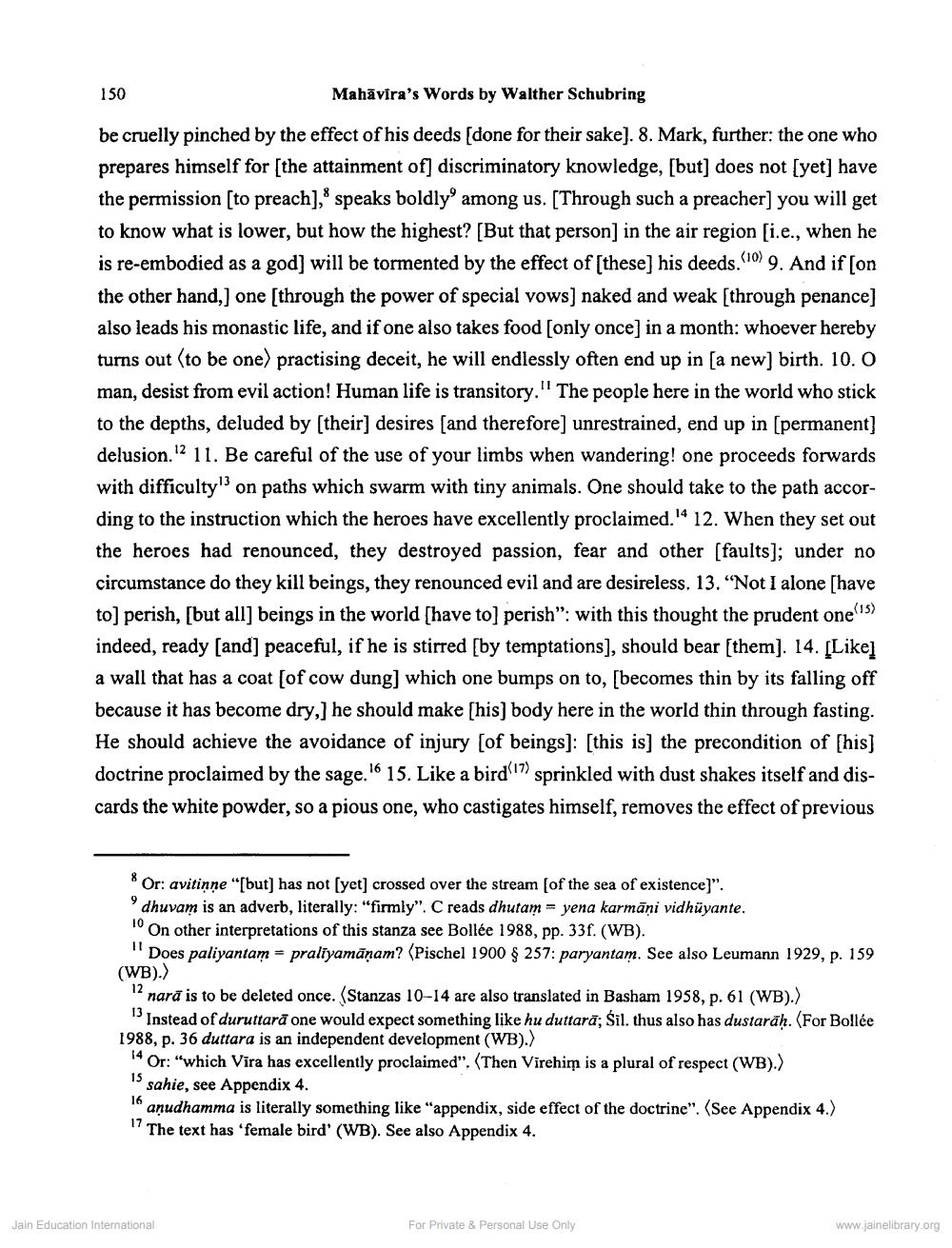________________
Mahavira's Words by Walther Schubring
be cruelly pinched by the effect of his deeds [done for their sake]. 8. Mark, further: the one who prepares himself for [the attainment of] discriminatory knowledge, [but] does not [yet] have the permission [to preach], speaks boldly among us. [Through such a preacher] you will get to know what is lower, but how the highest? [But that person] in the air region [i.e., when he is re-embodied as a god] will be tormented by the effect of [these] his deeds.(10) 9. And if [on the other hand,] one [through the power of special vows] naked and weak [through penance] also leads his monastic life, and if one also takes food [only once] in a month: whoever hereby turns out (to be one) practising deceit, he will endlessly often end up in [a new] birth. 10. O man, desist from evil action! Human life is transitory." The people here in the world who stick to the depths, deluded by [their] desires [and therefore] unrestrained, end up in [permanent] delusion." 11. Be careful of the use of your limbs when wandering! one proceeds forwards with difficulty" on paths which swarm with tiny animals. One should take to the path according to the instruction which the heroes have excellently proclaimed." 12. When they set out the heroes had renounced, they destroyed passion, fear and other [faults]; under no circumstance do they kill beings, they renounced evil and are desireless. 13. "Not I alone [have to] perish, [but all] beings in the world [have to] perish": with this thought the prudent one indeed, ready [and] peaceful, if he is stirred [by temptations], should bear [them]. 14. [Like] a wall that has a coat [of cow dung] which one bumps on to, [becomes thin by its falling off because it has become dry,] he should make [his] body here in the world thin through fasting. He should achieve the avoidance of injury [of beings]: [this is] the precondition of [his] doctrine proclaimed by the sage.16 15. Like a bird() sprinkled with dust shakes itself and discards the white powder, so a pious one, who castigates himself, removes the effect of previous
150
Or: avitinne "[but] has not [yet] crossed over the stream [of the sea of existence]". dhuvam is an adverb, literally: "firmly". C reads dhutam yena karmāņi vidhüyante. 10 On other interpretations of this stanza see Bollée 1988, pp. 33f. (WB).
"Does paliyantam = pralīyamāṇam? (Pischel 1900 § 257: paryantam. See also Leumann 1929, p. 159 (WB).)
12 nara is to be deleted once. (Stanzas 10-14 are also translated in Basham 1958, p. 61 (WB).)
13 Instead of duruttara one would expect something like hu duttară; Śil. thus also has dustaraḥ. (For Bollée 1988, p. 36 duttara is an independent development (WB).)
14 Or: "which Vira has excellently proclaimed". (Then Virehim is a plural of respect (WB).)
15
sahie, see Appendix 4.
16
aṇudhamma is literally something like "appendix, side effect of the doctrine". (See Appendix 4.)
17
The text has 'female bird' (WB). See also Appendix 4.
Jain Education International
For Private & Personal Use Only
www.jainelibrary.org




